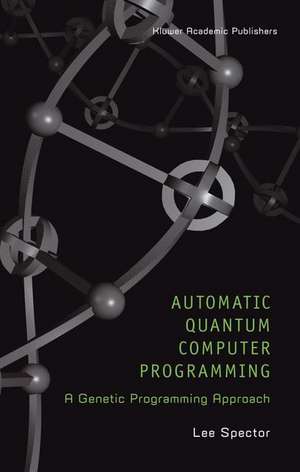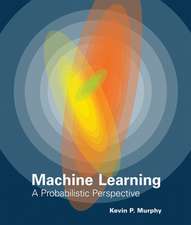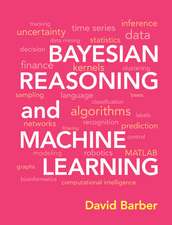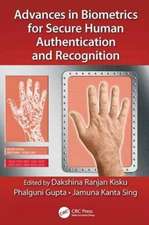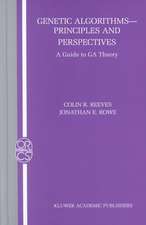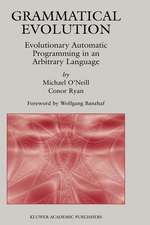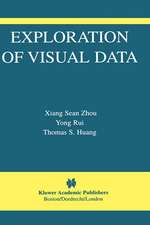Automatic Quantum Computer Programming: A Genetic Programming Approach: Genetic Programming, cartea 7
Autor Lee Spectoren Limba Engleză Hardback – 11 iun 2004
| Toate formatele și edițiile | Preț | Express |
|---|---|---|
| Paperback (1) | 811.60 lei 6-8 săpt. | |
| Springer Us – 4 oct 2006 | 811.60 lei 6-8 săpt. | |
| Hardback (1) | 815.89 lei 6-8 săpt. | |
| Springer Us – 11 iun 2004 | 815.89 lei 6-8 săpt. |
Preț: 815.89 lei
Preț vechi: 1019.87 lei
-20% Nou
Puncte Express: 1224
Preț estimativ în valută:
156.12€ • 163.34$ • 129.69£
156.12€ • 163.34$ • 129.69£
Carte tipărită la comandă
Livrare economică 02-16 aprilie
Preluare comenzi: 021 569.72.76
Specificații
ISBN-13: 9781402078941
ISBN-10: 1402078943
Pagini: 153
Ilustrații: XI, 153 p.
Dimensiuni: 155 x 235 x 15 mm
Greutate: 0.41 kg
Ediția:2004
Editura: Springer Us
Colecția Springer
Seria Genetic Programming
Locul publicării:New York, NY, United States
ISBN-10: 1402078943
Pagini: 153
Ilustrații: XI, 153 p.
Dimensiuni: 155 x 235 x 15 mm
Greutate: 0.41 kg
Ediția:2004
Editura: Springer Us
Colecția Springer
Seria Genetic Programming
Locul publicării:New York, NY, United States
Public țintă
ResearchCuprins
The Power of Quantum Computing.- Quantum Computer Simulation.- Quantum Computer Programming.- Genetic and Evolutionary Computation.- Genetic Programming.- Evolution of Complex Programs.- Evolution of Quantum Programs.- Evolved Quantum Programs.- Conclusions and Prospects.
Recenzii
From the reviews:
"I thoroughly enjoyed this book. It not only introduces quantum computing, but also genetic programming and the author's original genetic programming system "PushGP" which is used to evolve the quantum algorithms discussed in later chapters. The book is comprehensive, with wonderfully clear illustrations and comes with a Lisp-based quantum simulator program. Truly recommended for readers interested in gaining knowledge about exciting frontiers of computer science."
(Wolfgang Banzhaf)
"The book is very well written. Readers with some background in both genetic programming and quantum computing will be able to read it rapidly. … Scientific readers with a general interest in exploring automatic quantum programming, will also like this book. … I have really enjoyed reading this book, it will certainly become a reference book for GP researchers interested to apply genetic programming to search for quantum programs." (Michel Toulouse, Genetic Programming and Evolvable Machines, Vol. 7, 2006)
"I thoroughly enjoyed this book. It not only introduces quantum computing, but also genetic programming and the author's original genetic programming system "PushGP" which is used to evolve the quantum algorithms discussed in later chapters. The book is comprehensive, with wonderfully clear illustrations and comes with a Lisp-based quantum simulator program. Truly recommended for readers interested in gaining knowledge about exciting frontiers of computer science."
(Wolfgang Banzhaf)
"The book is very well written. Readers with some background in both genetic programming and quantum computing will be able to read it rapidly. … Scientific readers with a general interest in exploring automatic quantum programming, will also like this book. … I have really enjoyed reading this book, it will certainly become a reference book for GP researchers interested to apply genetic programming to search for quantum programs." (Michel Toulouse, Genetic Programming and Evolvable Machines, Vol. 7, 2006)
Caracteristici
Provides an introduction to quantum computing for non-physicists, as well as an introduction to genetic programming for non-computer-scientists Explores several ways in which genetic programming can support automatic quantum computer programming Presents detailed descriptions of specific techniques, along with several examples of their human-competitive performance on specific problems
Textul de pe ultima copertă
Computer science will be radically transformed if ongoing efforts to build large-scale quantum computers eventually succeed and if the properties of these computers meet optimistic expectations. Nevertheless, computer scientists still lack a thorough understanding of the power of quantum computing, and it is not always clear how best to utilize the power that it is understood. This dilemma exists because quantum algorithms are difficult to grasp and even more difficult to write. Despite large-scale international efforts, only a few important quantum algorithms are documented, leaving many essential questions about the potential of quantum algorithms unanswered.
These unsolved problems are ideal challenges for the application of automatic programming technologies. Genetic programming techniques, in particular, have already produced several new quantum algorithms and it is reasonable to expect further discoveries in the future. Theses methods will help researchers to discover how additional practical problems can be solved using quantum computers, and they will also help to guide theoretical work on both the power and limits of quantum computing.
Automatic Quantum Computer Programming provides an introduction to quantum computing for non-physicists, as well as an introduction to genetic programming for non-computer-scientists. The book explores several ways in which genetic programming can support automatic quantum computer programming and presents detailed descriptions of specific techniques, along with several examples of their human-competitive performance on specific problems. Source code for the author’s QGAME quantum computer simulator is included as an appendix, and pointers to additional online resources furnish the reader with an array of tools for automatic quantum computer programming.
"I thoroughly enjoyed this book. It not only introduces quantum computing, but also genetic programming and theauthor’s original genetic programming system ‘PushGP’ which is used to evolve the quantum algorithms discussed in later chapters. The book is comprehensive, with wonderfully clear illustrations and comes with a Lisp-based quantum simulator program. Truly recommended for readers interested in gaining knowledge about exciting frontiers of computer science."
—Wolfgang Banzhaf
Memorial University of Newfoundland
These unsolved problems are ideal challenges for the application of automatic programming technologies. Genetic programming techniques, in particular, have already produced several new quantum algorithms and it is reasonable to expect further discoveries in the future. Theses methods will help researchers to discover how additional practical problems can be solved using quantum computers, and they will also help to guide theoretical work on both the power and limits of quantum computing.
Automatic Quantum Computer Programming provides an introduction to quantum computing for non-physicists, as well as an introduction to genetic programming for non-computer-scientists. The book explores several ways in which genetic programming can support automatic quantum computer programming and presents detailed descriptions of specific techniques, along with several examples of their human-competitive performance on specific problems. Source code for the author’s QGAME quantum computer simulator is included as an appendix, and pointers to additional online resources furnish the reader with an array of tools for automatic quantum computer programming.
"I thoroughly enjoyed this book. It not only introduces quantum computing, but also genetic programming and theauthor’s original genetic programming system ‘PushGP’ which is used to evolve the quantum algorithms discussed in later chapters. The book is comprehensive, with wonderfully clear illustrations and comes with a Lisp-based quantum simulator program. Truly recommended for readers interested in gaining knowledge about exciting frontiers of computer science."
—Wolfgang Banzhaf
Memorial University of Newfoundland
